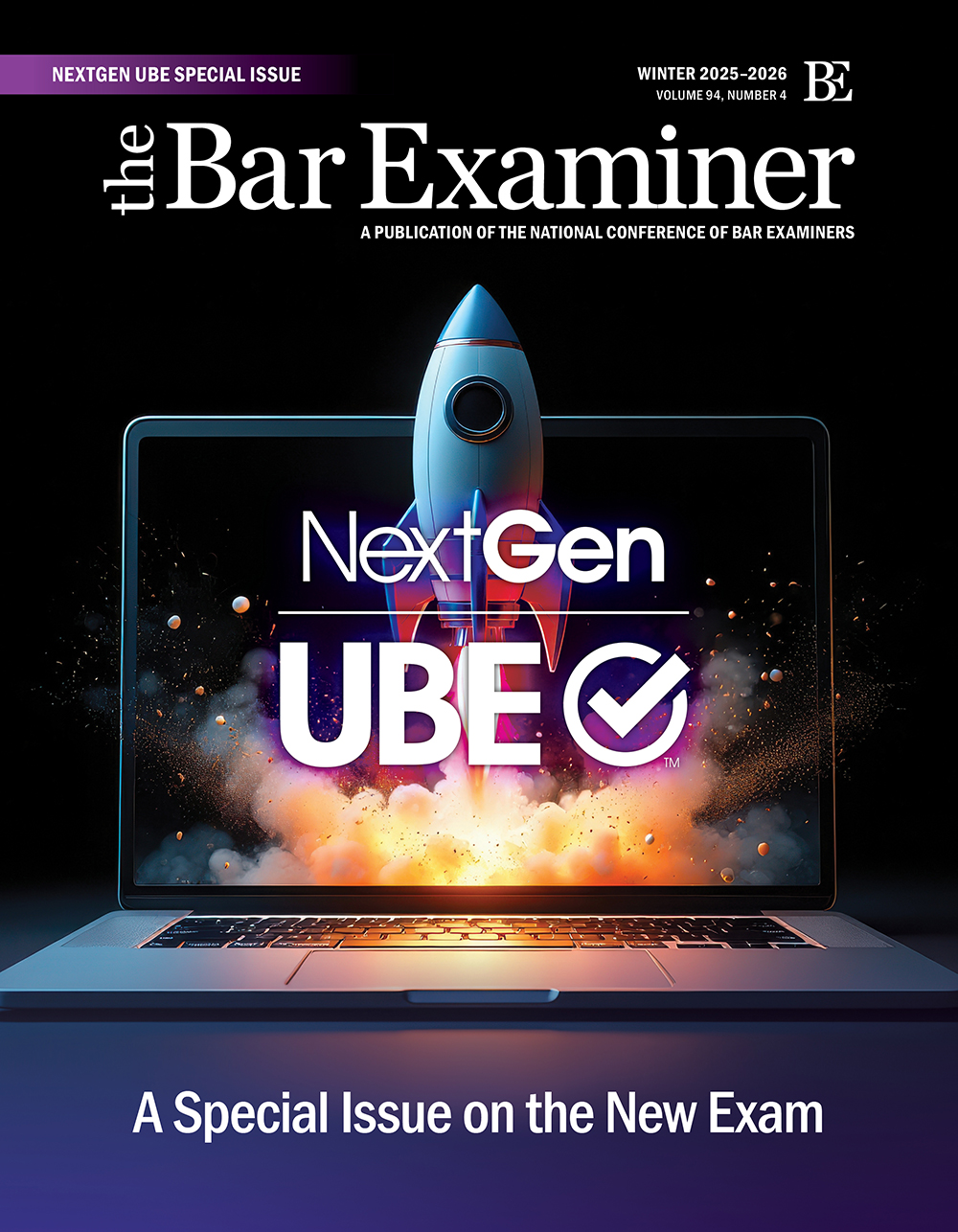This article originally appeared in The Bar Examiner print edition, March 2014 (Vol. 83, No. 1), pp. 2–3.
By Margaret Fuller Corneille When I was hired as Director of the Minnesota Board of Law Examiners 27 years ago, I knew nothing about bar admissions other than what it had taken me to pass the Ohio Bar Examination 10 years prior to coming to Minnesota. One of the first things I learned was how committed and involved bar examiners are and how much they contribute to the bar admissions process—not just in Minnesota, but in states all around the country.
When I was hired as Director of the Minnesota Board of Law Examiners 27 years ago, I knew nothing about bar admissions other than what it had taken me to pass the Ohio Bar Examination 10 years prior to coming to Minnesota. One of the first things I learned was how committed and involved bar examiners are and how much they contribute to the bar admissions process—not just in Minnesota, but in states all around the country.
My first day on the job happened to be a Board meeting day. Twice during that first day I was pulled aside, first by one Board member, then by another. Each wanted to tell me something about one of the other Board members. I expected that I was going to be warned about someone who was going to make trouble for me. Instead, both times, the Board member wanted me to know about the extraordinary contributions of another Board member and the many talents that Board member brought to the work of the Board.
Initially, I thought it was just the members of the Minnesota Board who deserved such praise. Soon I learned that hardworking and conscientious bar examiners are not the exception—they are the rule. It is because of this commitment and hard work that the process of lawyer licensing is performed in such a high-quality manner throughout the country. And it is a process that operates in large part on the contributions of volunteers.
Our state Supreme Courts deserve the credit for appointing excellent bar examiners. While state Supreme Courts in most jurisdictions have plenary authority over the process of admission of lawyers, they do not handle the many details of the admissions process, such as reviewing bar applications, conducting background investigations, and grading bar exams. This work is delegated to boards of law examiners, who perform this invaluable work for the Courts.
In most states, bar examiners are hand-picked by the members of the Court. The justices know that serving as a bar examiner is a time-consuming voluntary undertaking, so they seek out lawyers who are known for their commitment to the bar and their willingness to give significant time to volunteer work. Because they know that bar examiners assess the quality of bar exam questions and answers (for those jurisdictions that draft their own exam materials) as well as the honesty and integrity of bar applicants, state Supreme Courts find smart lawyers with good judgment and calm temperaments. Those qualities, sometimes especially the calm temperament, are essential to the work of bar examiners.
Like the state Supreme Courts, the bar admissions staff members who capably guide the admissions process in each state are also immensely reliant on the work of bar examiners. Bar examiners devote countless hours to the wide range of tasks that comprise the various steps of the admissions process—all while ensuring the overall fairness and high quality of that process.
New bar examiners are often surprised to learn how significantly bar admissions processes vary from state to state, including the role of the bar examiner. In some states, bar examiners do everything—they draft questions, grade questions, interview applicants with character and fitness issues, hold formal hearings on denials to the bar, and appear before the Supreme Court to argue in support of their decisions. In other states, the board is a policy body only—and bar examiners are responsible for reviewing and approving bar admissions policies, overseeing the process by which exam graders are hired and do their work, and overseeing the work of the assistant attorneys general or disciplinary lawyers who conduct the character and fitness hearings or appear before the Court for appeals.
Some bar examiners are paid for their service (never enough to come close to what they make in the practice of law, but more than a token). However, all bar examiners are truly volunteers. Most devote a significant number of hours of work and are paid only with a box lunch, the camaraderie of fellow bar examiners, and the satisfaction of knowing that they are contributing to the gatekeeping function of their state’s bar.
As was the case on my first day on the job, most new bar examiners are only vaguely aware of what is involved in bar admissions. But they quickly become fascinated by the process. In addition to the work they perform for their state’s board, soon they find themselves volunteering to serve on NCBE committees, giving up a weekend or two a year to discuss examination policy issues or spending long hours preparing presentations for NCBE’s annual educational conference. The level of commitment of bar examiners can be seen at these annual conferences: the rooms are always full, the audience is focused and listening intently, and insightful questions are being asked.
Once they become bar examiners, many don’t want to leave the work behind when they’ve reached their term limits on the board. Some states have required term limits as brief as 3 years; others as long as 6, 9, or 12 years. And in a few states, examiners seem to serve in perpetuity, but always at the pleasure of the Court. Even in states with term limits, however, former bar examiners who have given up their other responsibilities may be called upon to conduct character and fitness interviews of applicants with troubling records. The volunteers step forward again willingly.
Bar examiners play a critical role in the process of bar admissions. Understanding the importance of that role, they devote their time and energy to ensuring the quality of the bar admissions process and to making sure that those who are admitted to the bar will be strong contributing members. It’s been an honor for me to work with so many bar examiners who are devoted to doing their best to ensure that those who join the profession are qualified to take on its responsibilities.
Best regards to all.
Sincerely,

Margaret Fuller Corneille
Contact us to request a pdf file of the original article as it appeared in the print edition.







